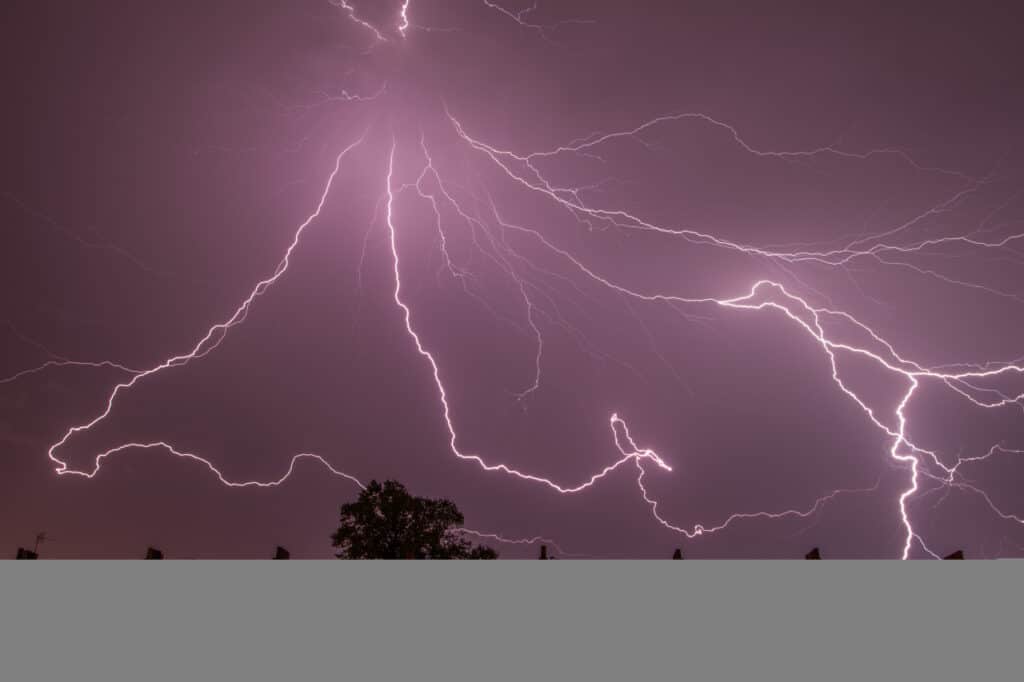Static electricity is something that we will come across at many points in our lives, but it often fails to make much of an impression. This can lead us to believe, mistakenly, that somehow, static electricity is safer than the electric current that comes out of our plug sockets. In fact, static electricity is an extremely powerful force and it represents a major risk factor in life.
Static electricity can start a fire in some situations. It can create a spark that can easily ignite flammable vapors. Lightning is an extreme example of static electricity, and it starts fires all the time.
Now, this doesn’t mean that walking across scratchy carpet barefoot will lead to burning down your home, either. So, let’s take a look at static electricity in more detail and examine the risks closely.
Your # 1 priority is keeping your family safe. As a firefighter, I recommend everyone has updated smoke detectors that don’t require battery changes, like these ones from Kidde, a fire extinguisher, like this one from Amerex, and a fire escape ladder if you have bedrooms above the first floor, I recommend this one from Hausse.
Also read: How To Put Out An Electrical (Class C) Fire: Firefighter Approved
What Is Static Electricity?

Static electricity occurs whenever there is an imbalance of electrical charge either on the surface of something or within it.
The charge, whether positive or negative, is trapped until given the means to move away from the material – this can be done via an electric current or by electrical discharge.
It is called “static” electricity because this property allows it to remain still until activated. The other form of electricity could be described as “current” electricity given that it flows from A to B through wires or conductors.
How Is A Static Electrical Charge Created?
A static charge is generated by the friction between two surfaces, where one surface has a very high resistance to electric current (thus, effectively it acts as an insulator, unable to accept any charge that is created by the friction).
Static electricity is a phenomenon that most of us are all too aware of having heard or felt the results of discharge when coming into contact with someone or something with such a charge.
We also witness the energy of discharge in things like the discharge of a lightning bolt, which is, of course, an incredible release of static electricity’s energy.
Also read: How Hot Is Lightning? Hotter Than The Sun?
How Is Static Electricity Discharged?
Static electricity can be displaced by moving it from one place to another or it can be discharged.
When it discharges it can release heat, light, and sound and if you are in contact with the discharge, it can also be quite painful.
This is the “static shock” that most people will experience in their lives. It’s the instant neutralization of the charge and an energy release to go alongside it.
Can Static Electricity Start A Fire?
Yes, though the kind of static charge that builds upon people in their homes is unlikely to start a fire due to its own energy – it can start a fire.
How? Well, when that static discharges it can produce a spark and if there are volatile flammable vapors around when the spark is produced, they can ignite.
This is why many facilities that store large amounts of flammable equipment will issue anti-static clothing, footwear, and even bracelets to prevent static discharge from causing a large-scale explosion!
You may also be asked to wear an anti-static wristband when working with electronic equipment because though the discharge won’t set fire to a circuit board, it can overwhelm/overload the electronic components and render them useless.
On a larger scale, lightning, the most ferocious form of static discharge provides so much heat and light that things struck by lightning can burst into flame, this includes any human being unlucky enough to be caught in the open when lightning strikes.
This is why when there is a storm with lightning, it’s important to try and get out of the way of the lightning rather than allowing it to flow through you when it strikes. Going inside is your best bet, but lying flat on the ground can help, don’t use an umbrella which can draw the strike due to metal components.
Also read: Can Batteries Catch On Fire? Do They Ever Explode?
Can Static Electricity Start A Fire At A Gas Pump?
In theory, yes.
If you can generate a spark in gasoline vapors you ought to be able to ignite those vapors. But given that driving a vehicle can generate a fairly hefty static charge (many will testify they’ve got a static shock when closing the car door after a journey), why don’t we hear of gas stations exploding on a regular basis?
Well, in reality, gasoline vapor doesn’t just hang in the air in large quantities, it forms a thin narrow cone around the pump, and you’d have to go quite a bit above the pump to find enough gasoline to ignite with your static spark.
Take a look here:
So, while it’s not impossible for static to start a fire at a gas pump, it’s not common.
Can Static Electricity Start A Fire In A Blanket?
One of the most common causes of static in our everyday lives is clothing and textiles. Many warm winter blankets create a static charge when they rub against our bedsheets as we sleep under them.
Does this mean that we’re at risk of spontaneous combustion in our beds? Do we need to choose our blankets carefully?
No, of course, not. Blankets may be warm and comfy, but they don’t start fires by themselves. While you might, indeed, generate enough static overnight to give yourself a little shock in the morning and, perhaps, generate a spark, a spark is not enough to set fire to a blanket.
The only way you’d be able to start a blanket fire with static electricity is if the blanket had been doused in petrol or alcohol or other flammable substance first and frankly, that would make for a very uncomfortable blanket.
Also read: Can Christmas Lights Start A Fire?
Is Static Electricity Dangerous, Can It Hurt You?
Yes. A lightning strike could kill you and, in fact, every year, lightning kills dozens of people.
However, we wouldn’t spend too much time worrying about this because it’s completely out of your control and as long as you don’t spend too much of your life wandering about in thunderstorms, you’re not likely to suffer this fate.
However, is it possible that the static charges that we build upon ourselves could suddenly cause us some form of major harm?
We think that this is unlikely, in the same way, that we think it’s unlikely that it would cause your clothing to burst into flame (see blankets above as to why).
It’s not that static electricity can’t be dangerous, it’s that the accumulation of static electricity in day-to-day life just isn’t likely to lead to enough static being built up to cause any real harm.
What Are The Dangers Of Static Electricity?
The biggest dangers of static in our ordinary lives are the potential of creating a spark that might lead to igniting something flammable around us – you can minimize this danger by wearing anti-static clothing and footwear as well as using an anti-static wristband.
There’s also lightning, but if you stay out of thunderstorms, you’re doing about as much as you can to avoid being struck by lightning.
Is Static Electricity Harmful To Humans?
While we’ve demonstrated that static electricity can, in certain circumstances, be dangerous to humans, the kind of static charge that we build up wandering about on a daily basis is unlikely to be harmful.
Can Static Electricity Hurt Your Heart?
In theory, maybe. It doesn’t take very much in the way of an electric current to stop your heart from beating and if it’s not restarted artificially, it won’t start again.
However, while this requires “only” 0.2 amps, we think it’s very unlikely that day-to-day static would ever deliver this much current to your heart.
However, lightning certainly could. A lightning strike could even cause a heart attack.
Why Does Everything I Touch Give Me A Shock?
It’s probably to do with the shoes you’re wearing, if they’re rubbing against the floor and picking up a charge when you touch something, you’re going to discharge.
Change the shoes or have the soles coated in rubber to put a stop to this.
Related Articles
The Best Fire Extinguisher for Lithium-Ion Batteries – 2022

